As front-end dogs, we have to deal with web pages every day. When the UI sends you a design draft, knowledge of CSS is particularly important. However, CSS, a markup language, often gives me a headache: it has no logic and is full of all kinds of hidden rules. So every time I work on a project, most of my time and energy are wasted on adjusting the layout and layout. In terms of style, for details, please click on Why is CSS so difficult to learn on Zhihu?
Text
margin can be regarded as a strong-willed attribute. Below, I will explain the scary aspects of margin from various aspects.
Influence of element size
Usually the size of an element can be divided into: visible size and occupied size
Visible size-clientWidth (border - padding - size)
Occupied size - outerWidth (border - margin)

How does margin affect these two sizes?
First of all, both sizes need to meet certain conditions.
Influence conditions of visual size
Applicable to block-level elements that do not have width/height set (width and height are set to death, how can it be affected?)
Does not include float absolute fixed elements, inline horizontal, table-cell elementsOnly applicable to horizontal dimensions (margin-left/margin-right)
Influence conditions of occupying size
Applies to block/inline-block horizontal elements
Applies to any direction
It has nothing to do with the width/height value
The inline element only affects the horizontal direction (will be mentioned later)
Influence example
margin affects the visual horizontal size of the element
Margin's visual size examplemargin affects the occupied size, This can be said to be the natural skill of margin, so I won’t give an example.
Percent unit
Generally speaking, among the units of margin, the percentage unit is the most likely to make people dizzy.
-
The percentage margins of ordinary elements are calculated relative to the width of the container
<style> #parent { margin: 20px 400px; width: 100px; height: 200px; } #child { /* 等价于 margin: 5% * 父元素的宽度 10% * 父元素的宽度; */ margin: 5% 10%; /* 父元素的宽度 * 50% */ width: 50%; /* 父元素的高度 * 50% */ height: 50%; } </style> <p> </p><p></p> -
The percentage margin of absolute positioning It is calculated relative to the width of the first ancestor element with positioning attribute (relative/absolute/fixed)
<style> #parent { width: 100px; } #child { /* 注意子元素已增加绝对定位,则百分比按照定位属性的祖先元素的宽度计算, 本例中是浏览器视口 */ position:absolute; /* 等价于 margin: 5% * 父元素的宽度 10% * 父元素的宽度; */ margin: 5% 10%; } </style> <p> </p><p></p>
Overlap details
Overlap is the most important unspoken rule in margin.
What happens
Adjacent sibling elements
Parent and first/last child element
Empty block-level elements (self and self)
Overlapping conditions
Block-level elements ( Excluding float and absolute elements)
Does not consider writing-mode, only occurs in the vertical direction (margin-top/margin-bottom)
Parent-child overlap condition
margin-top overlap
margin-bottom overlap
The parent element's non-formatting context element has no overflow:hidden setting
The parent element has no border-bottom setting
The parent element has no padding-bottom setting
There is no inline element separation between the parent element and the first child element
The parent element has no height, min-height, max-height restrictions
Parent element non-formatting context element is not set overflow:hidden
Parent element has no border-top Set
The parent element has no padding-top. Set
There is no inline element separation between the parent element and the first child element
Empty block-level element margin overlap condition
1. 元素没有 border 设置 2. 元素没有 padding 设置 3. 里面没有 inline 元素 4. 没有 height,或者 min-height
Calculation rules
-
Taking the largest positive value
<style> #top{ margin-top:30px; } #bottom{ margin-bottom:20px; } </style> <p></p> <p></p> 两个元素垂直距离为 : #top元素的 margin-top值 -
Add positive and negative values
<style> #top{ margin-top:-30px; } #bottom{ margin-bottom:20px; } </style> <p></p> <p></p> 两个元素垂直距离为: #top元素的margin-top值 加上 #bottom元素的margin-bottom值 -
negative most negative value
<style> #top{ margin-top:-30px; } #bottom{ margin-bottom:-20px; } </style> <p></p> <p></p> 两个元素垂直距离为 : #top元素的 margin-top值 Parent The level overlaps with the first/last child element
Setting a vertical margin for the child element is equivalent to setting the same vertical margin attribute for the parent element.
That is to say, when the margin of the parent and child elements overlaps , they both share a margin attribute
Overlapping meaning
Continuous paragraphs or lists, etc., if there is no margin overlap, the layout will be unnatural.
Nesting or directly placing any empty p anywhere on the page will not affect the original layout.
Missing any number of empty p elements will not affect the original reading layout.
margin auto
When you use margin auto, you should think of one word: fill
A block-level element without set width and height will automatically fill the widthIf one side is a fixed value and one side is auto, then auto is the size of the remaining space
If both sides are auto, then the remaining space will be divided equally
The example is as follows:
<style>
#demo{
width: 500px;
margin-right:100px;
/* margin-left: 100vw - margin-right - width*/
margin-left:auto;
}
</style>
<p></p>
margin:auto 0 !== 垂直居中
以上,我们可得当一个块级元素设置了 margin: 0 auto 可以实现水平居中,
而为什么 margin:auto 0 不会垂直居中?
答:一个块级元素会自动填充可用的水平尺寸,但不会填充垂直尺寸,是因为其根本没有任何可用的垂直空间。也就是说 margin: 0 auto , 总是有尺寸可以来填充的! 而 margin: auto 0 是没有任何尺寸的可以来填充的。
失效情况
当子元素的宽度大于父元素的宽度 ,是无法通过 margin: 0 auto 实现居中的
因为,这个时候已经没有任何空间可以填充了,当宽度超出父元素时,margin 已经为负值了。
垂直居中
-
writing-mode 与垂直居中
<style> .father{ writing-mode: vertical-lr;/* 更改流的方向为 垂直方向 */ } .son{ margin: auto; } </style> <p> </p><p></p> -
绝对定位元素
<style> .parent{ position: relative; } .child{ position: absolute; top: 0; bottom: 0; left: 0; right: 0; margin:auto; } </style> <p> </p><p></p>
失效情景
inline 水平元素的垂直margin 无效(margin-top/margin-bottom)
margin 重叠发生
绝对定位元素非定位方位的 margin值 "无效"
因为 绝对定位元素 脱离了文档流,与相邻元素没有关系,所以它不可能像普通元素一样,设置margin,推走其他元素margin 鞭长莫及
因为 有某些元素破坏了 文档流,设置了 float absolute,造成了假象,margin不会根据 这些破坏元素作为标准display:table-cell/display:table-row 等声明的margin无效!某些替换元素除外,根据各个浏览器的实现方式作为区分。比如,给 button 元素声明 display:table-cell,但在 chrome 中,button 的 display 属性是 inline-block 。
内联特性导致 margin 失效
margin-top: 负无穷, 但是,小到 1em 便无效了。
因为它是内联元素,默认是基线对齐,x字母下边缘对齐,margin 值再大,也不会起作用。
margin负无穷情景解析
其他属性
margin-start
正常流向,margin-start 等同于 margin-left,两者重叠不相加
如果水平流向是从右向左,margin-start 等同于 margin-right
在垂直流下 ( writing-mode:vertical-*; ) margin-start 等同于 margin-top
margin-end 与 margin-start 相对
margin-before 默认情况等同于 margin-top
margin-after 默认情况等同于 margin-bottom
margin-collapse
-
margin-collapse:collapse;
(默认值) 发生重叠
-
margin-collapse:discard;
取消重叠,margin 重叠部分为 0 ,没有margin
-
margin-collapse:separate;
不发生重叠,margin 重叠部分为 margin-top + margin-bottom
相关推荐:
The above is the detailed content of Detailed explanation of the margin attribute of css. For more information, please follow other related articles on the PHP Chinese website!
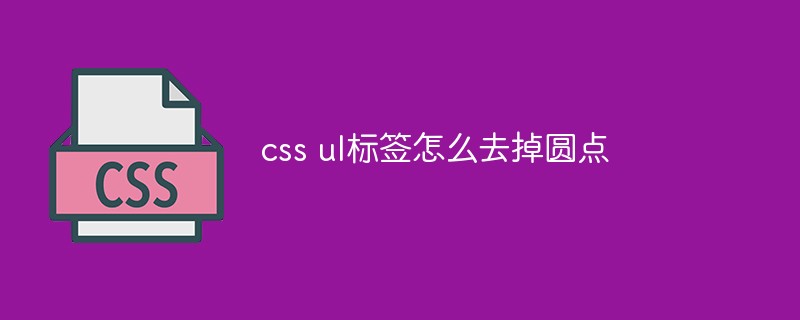 css ul标签怎么去掉圆点Apr 25, 2022 pm 05:55 PM
css ul标签怎么去掉圆点Apr 25, 2022 pm 05:55 PM在css中,可用list-style-type属性来去掉ul的圆点标记,语法为“ul{list-style-type:none}”;list-style-type属性可设置列表项标记的类型,当值为“none”可不定义标记,也可去除已有标记。
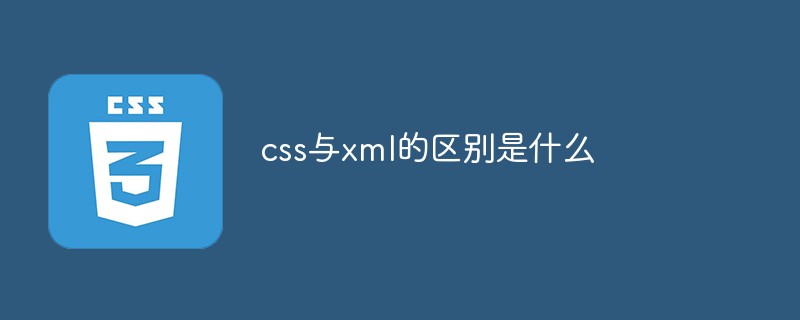 css与xml的区别是什么Apr 24, 2022 am 11:21 AM
css与xml的区别是什么Apr 24, 2022 am 11:21 AM区别是:css是层叠样式表单,是将样式信息与网页内容分离的一种标记语言,主要用来设计网页的样式,还可以对网页各元素进行格式化;xml是可扩展标记语言,是一种数据存储语言,用于使用简单的标记描述数据,将文档分成许多部件并对这些部件加以标识。
 css3怎么实现鼠标隐藏效果Apr 27, 2022 pm 05:20 PM
css3怎么实现鼠标隐藏效果Apr 27, 2022 pm 05:20 PM在css中,可以利用cursor属性实现鼠标隐藏效果,该属性用于定义鼠标指针放在一个元素边界范围内时所用的光标形状,当属性值设置为none时,就可以实现鼠标隐藏效果,语法为“元素{cursor:none}”。
 CSS 边界属性详解:padding,margin 和 borderOct 21, 2023 am 11:07 AM
CSS 边界属性详解:padding,margin 和 borderOct 21, 2023 am 11:07 AMCSS边界属性详解:padding,margin和borderCSS是一种用于控制和布局网页元素的样式表语言。在网页设计中,边界属性是其中一项非常重要的部分。本文将详细介绍CSS中边界属性的使用方法,并提供具体的代码示例。padding(内边距)padding属性用于设置元素的内边距,即元素内容和元素边界之间的空间。我们可以用正数或百分比值来设置内边距
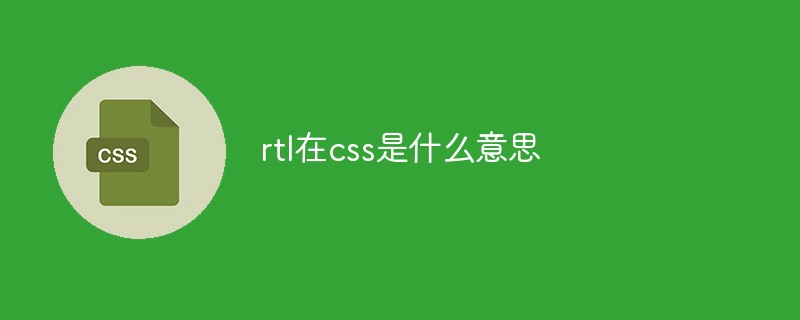 rtl在css是什么意思Apr 24, 2022 am 11:07 AM
rtl在css是什么意思Apr 24, 2022 am 11:07 AM在css中,rtl是“right-to-left”的缩写,是从右往左的意思,指的是内联内容从右往左依次排布,是direction属性的一个属性值;该属性规定了文本的方向和书写方向,语法为“元素{direction:rtl}”。
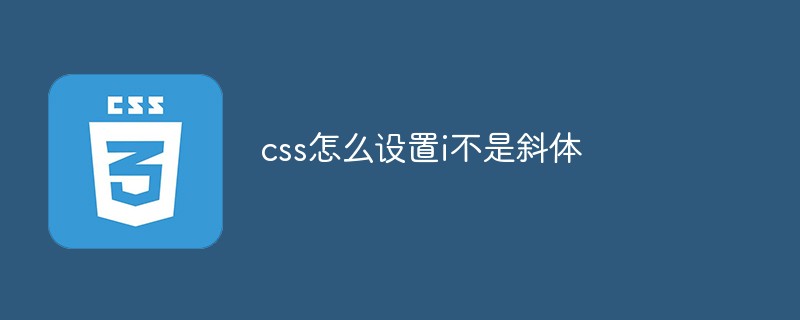 css怎么设置i不是斜体Apr 20, 2022 am 10:36 AM
css怎么设置i不是斜体Apr 20, 2022 am 10:36 AM在css中,可以利用“font-style”属性设置i元素不是斜体样式,该属性用于指定文本的字体样式,当属性值设置为“normal”时,会显示元素的标准字体样式,语法为“i元素{font-style:normal}”。
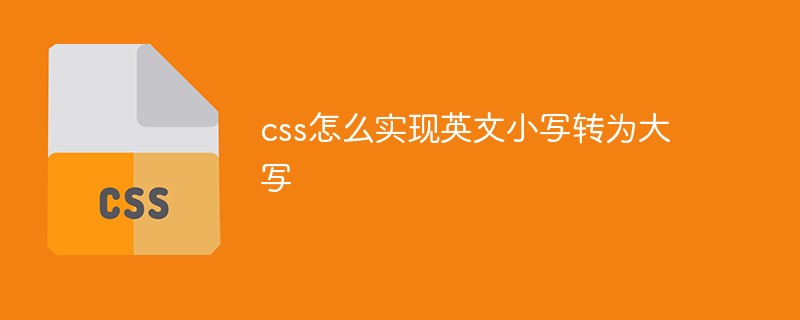 css怎么实现英文小写转为大写Apr 25, 2022 pm 06:35 PM
css怎么实现英文小写转为大写Apr 25, 2022 pm 06:35 PM转换方法:1、给英文元素添加“text-transform: uppercase;”样式,可将所有的英文字母都变成大写;2、给英文元素添加“text-transform:capitalize;”样式,可将英文文本中每个单词的首字母变为大写。
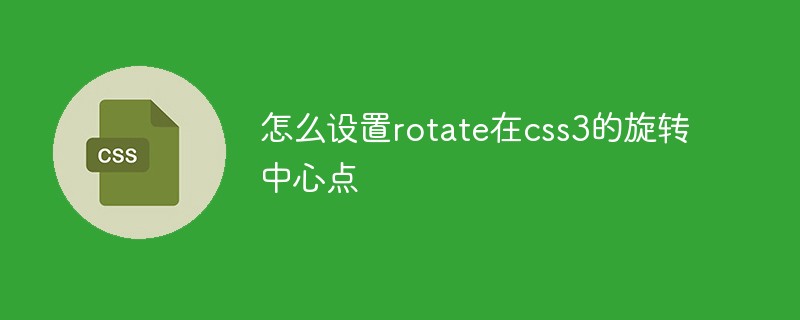 怎么设置rotate在css3的旋转中心点Apr 24, 2022 am 10:50 AM
怎么设置rotate在css3的旋转中心点Apr 24, 2022 am 10:50 AM在css3中,可以用“transform-origin”属性设置rotate的旋转中心点,该属性可更改转换元素的位置,第一个参数设置x轴的旋转位置,第二个参数设置y轴旋转位置,语法为“transform-origin:x轴位置 y轴位置”。


Hot AI Tools

Undresser.AI Undress
AI-powered app for creating realistic nude photos

AI Clothes Remover
Online AI tool for removing clothes from photos.

Undress AI Tool
Undress images for free

Clothoff.io
AI clothes remover

AI Hentai Generator
Generate AI Hentai for free.

Hot Article

Hot Tools

MinGW - Minimalist GNU for Windows
This project is in the process of being migrated to osdn.net/projects/mingw, you can continue to follow us there. MinGW: A native Windows port of the GNU Compiler Collection (GCC), freely distributable import libraries and header files for building native Windows applications; includes extensions to the MSVC runtime to support C99 functionality. All MinGW software can run on 64-bit Windows platforms.

DVWA
Damn Vulnerable Web App (DVWA) is a PHP/MySQL web application that is very vulnerable. Its main goals are to be an aid for security professionals to test their skills and tools in a legal environment, to help web developers better understand the process of securing web applications, and to help teachers/students teach/learn in a classroom environment Web application security. The goal of DVWA is to practice some of the most common web vulnerabilities through a simple and straightforward interface, with varying degrees of difficulty. Please note that this software

SecLists
SecLists is the ultimate security tester's companion. It is a collection of various types of lists that are frequently used during security assessments, all in one place. SecLists helps make security testing more efficient and productive by conveniently providing all the lists a security tester might need. List types include usernames, passwords, URLs, fuzzing payloads, sensitive data patterns, web shells, and more. The tester can simply pull this repository onto a new test machine and he will have access to every type of list he needs.

WebStorm Mac version
Useful JavaScript development tools

SublimeText3 Linux new version
SublimeText3 Linux latest version







